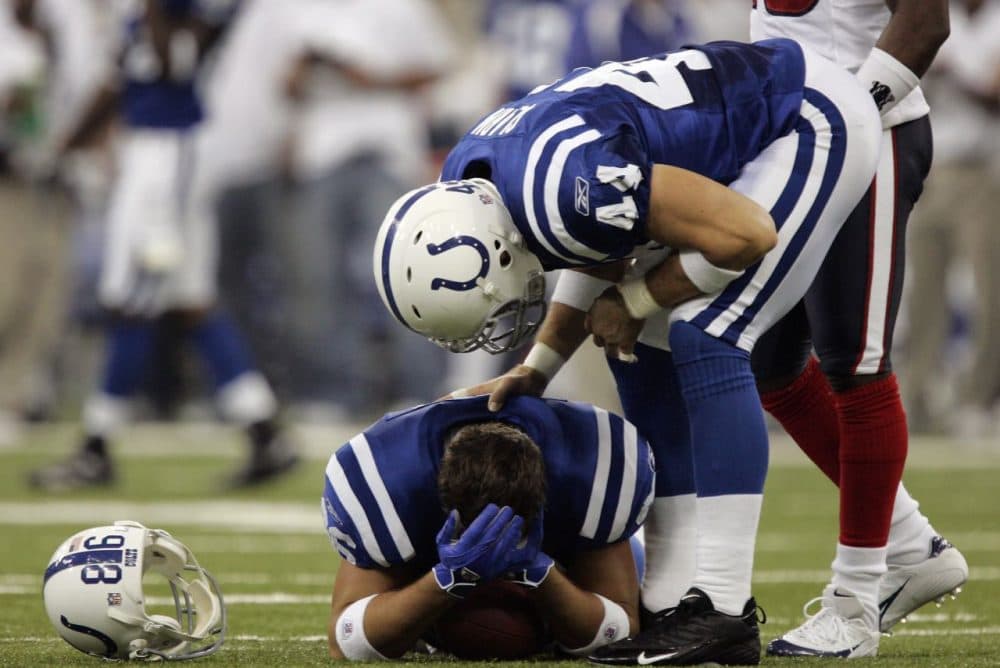Advertisement
NFL Gives Concussion Spotters More Power With 'Julian Edelman' Rule
Resume
First, the NFL required teams to evaluate players who might be concussed before allowing them back into the game. But players were still suffering concussions, so the league added independent "spotters" who would watch the games from above. That plan wasn't foolproof either, so on Tuesday, NFL owners approved a new rule giving those spotters the authority to contact game officials directly and halt play.
Ben Utecht played in the NFL from 2003 until 2008, and he knows something about football-related concussions. He’s suffered at least five of them. He joined Bill Littlefield.
BL: A concussion ended your career back in 2008. You now speak on behalf of the American Academy of Neurology, though not on the particular matter of the spotters. How’s your health, post-retirement?
BU: I'm happy to say that I don't have a diagnosis. So from that perspective, I'm doing well and I pray that that day never comes. But I have been vocal about my memory issues. That's been one of the struggles I've faced as a 33-year-old man who played six seasons in the NFL, it has been somewhat of an eye-opening struggle for me in certain situations.
[sidebar title="Complete Concussions Coverage" width="630" align="right"]For years OAG has tracked the latest news and research on concussions.[/sidebar]
BL: I'm curious about how you feel about this new rule.
BU: Well, honestly on paper it looks very good. I mean, this kind of control, especially revolving around brain injury that occurs on a field of play, is necessary. So I applaud the NFL for taking this step in the right direction in that regard.
BL: The spotters rule has been referred to as the "Julian Edelman Rule," because Edelman, who plays for the Patriots, was obviously disoriented at one point during the Super Bowl. At least one reporter says he heard a spotter in the press box alert the team that Edelman should be examined, but he never did come out of the game. I wonder if you feel the new rule somehow makes that less likely that that will happen?
BU: Wow. Well, therein lies the question of the day, isn't it? What actually happens behind the scene is, I think, is challenging. As a former player, these are the types of questions that we really need and want answers for. There has to be an accountability program. We need to make sure that if, in fact, the spotters are seeing things that need to be addressed, that the follow-through by the teams is occurring.
BL: Do you think, all of this considered, NFL players should feel safer when they take the field next season as a result of this rule?
BU: I think that there is a level of safety because of this rule that hasn't been there in the past. And from this rule to the rule regarding leading with the head, I believe, I might have been saved from some concussions because of that rule. So I definitely think that these rules are helpful. At the same time, we cannot have football without concussions. Because of that, what needs to take place is making sure that these organizations, who do a lot of good, but who also make billions of dollars off of players getting injuries, especially concussions — that those players are taken care of.
[sidebar title="Borland Retires At 24" width="630" align="right"]Giants running back Andre Williams weighs in on Chris Borland's decision to retire from the NFL after just one season due to concerns about head injury.[/sidebar]
BL: The last concussion you suffered occurred during training, not during a game. Has the NFL done anything to ensure that players are being evaluated when the cameras aren't rolling?
BU: In my six years of playing, in my three documented concussions, I never once saw a neurologist. I've often questioned, why is a neurologist, the expert of brain diagnosis, never really involved in either sideline or the spotting position?
BL: Of course you'd also have to make sure that the doctors realized that they weren't working for the coach.
BU: Well, and that's a tricky thing because there are a number, at least when I was playing, you know it was understood that doctor's offices--you know, orthopedic practices, chiropractic practices--these people would be paid money to be associated with the team, right? That's a challenging balance to maintain.
This segment aired on March 28, 2015.